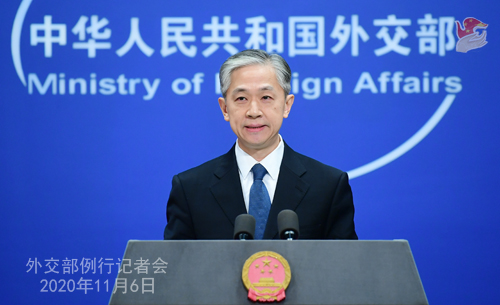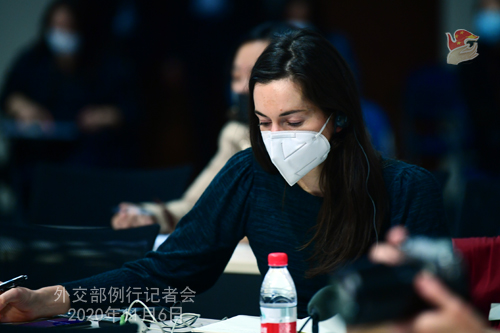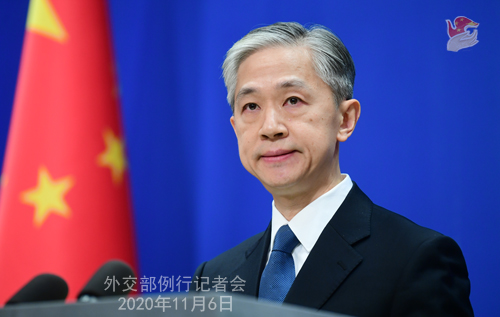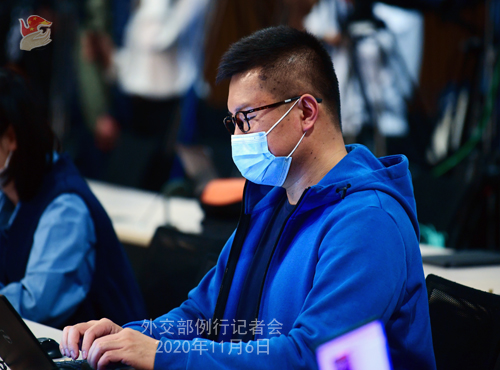| Foreign Ministry Spokesperson Wang Wenbin's Regular Press Conference on November 6, 2020 |
| 2020-11-06 18:31 |
|
CCTV: The medical supplies sent by the Chinese government through the Organization of African First Ladies for Development (OAFLAD) have been delivered to 53 African countries for women, children and the youth to fight COVID-19. Can you tell us more about it? Wang Wenbin: The medical supplies sent by the Chinese government through the Organization of African First Ladies for Development (OAFLAD) have been smoothly delivered to 53 African countries for women, children and the youth to fight COVID-19. Overcoming difficulties like restricted international logistics due to the pandemic, China managed to deliver all the medical supplies within four months. With the extensive support from the local governments and the OAFLAD, the supplies have been distributed and used in those countries. The African governments and people commended this effort and said that the assistance will better enable African women, children and youth to fight COVID-19, and that mutual assistance, solidarity and cooperation is of vital importance to winning this battle. China and Africa have been voicing support for each other and tiding over difficulties together since the pandemic broke out. In spite of domestic pressure of virus containment, China has provided a lot of urgently needed medical supplies to the African Union and African countries through various channels. We held six health experts' meetings with the African side via videoconference to share our experience, sent medical professionals to 15 African countries, and 46 Chinese medical teams in Africa helped the local communities combat the epidemics. China also pledged to provide Chinese vaccines to African and other developing countries on a priority basis when they become available for deployment. I'd like to stress that China and Africa share deep, unbreakable friendship. Faced with whatever risks or challenges, China will join hands with our African brothers to forge ahead, foster a China-Africa community with a shared future, and hold high the banner of China-Africa friendship. Beijing Daily: I have three questions on epidemic containment. First, can you tell us the considerations behind the recent notices published by Chinese embassies that require stricter measures on passengers taking international flights to China? Second, among all the recent measures people are especially focusing on the requirement of "certificates of negative nucleic acid and IgM anti-body test results". Can you tell us if there are some specific considerations? Third, people are also following the requirement that travelers going to China via connecting flights will need to take extra tests. Could you tell us why this is necessary? Wang Wenbin: On your first question, as the epidemic situation overseas is getting worse, China is facing greater risks of imported cases. In October, the number of imported cases stood at 515, up by 45 percent compared with that in September. In the meantime, there were also some domestic cases. Under such circumstances, we have drawn upon other countries' practices and further strengthened pre-departure prevention and control measures for travelers coming to China. This helps not only preserve the hard-won epidemic containment results in China, but also minimize the risk of cross infection during the travel and safeguard people's health and security. On your second question, the pre-departure nucleic acid testing for China-bound travelers has been essential in preventing epidemic importation. However, none of the existing test methods can be 100 percent accurate at the moment. According to the competent authorities, IgM anti-body test results are stable, and the passengers' test results can be a lot more accurate if the test methods are combined. That's why we now need IgM anti-body testing, too. We tried this in some countries earlier, and the effect was good. As I know, similar measures have been taken by some other countries, too. On your third question, as I just said, the epidemic situation overseas is very serious. Every time a passenger traveling to China transits in one more place, he or she will face greater risks of infection. Judging from previous imported cases, many people who had tested negative before traveling got infected later, the number of which accounted for nearly half of the imported cases. Therefore, an additional test in the transit place is necessary for epidemic prevention and control. At the same time, if you really need to make cross-border trips, we advise you to properly plan your route, always choose direct flights where possible and avoid transfers.
AFP: Can you give any confirmation or details today about the reported restrictions on Australian imports? Wang Wenbin: I took similar questions many times in recent days. I'd like to emphasize that the Chinese competent authorities' measures on foreign imports are in line with Chinese laws and regulations and international customary practices, and are responsible for Chinese consumers and domestic industries. They are reasonable, legitimate and thus beyond reproach. Opening up is China's basic state policy. Upholding a vision of openness, cooperation, solidarity and mutual benefit, China will stay committed to greater opening up. We act on our words. The measures we announced at the second CIIE to deepen opening up have been implemented in an all-round manner. Over the past year, China's import of goods and services grew much faster than the global average. The third CIIE is being held as scheduled despite the pandemic, and companies across the world are proactively participating. The World Bank's Doing Business Report 2020 ranks China higher at the 31st place in the world. Judging by the facts, there's no doubt that China has achieved tangible outcomes in advancing opening up and win-win cooperation. I noticed that some in Australia have recently been questioning China's measures, with some even accusing China of violating international trade rules. I'd like to point out that since 2018, more than 10 Chinese investment projects have been rejected by Australia citing ambiguous and unfounded "national security concerns". That includes banning Chinese companies from its 5G network building and putting restrictions in areas like infrastructure, agriculture and animal husbandry. So far Australia has launched as many as 106 anti-dumping and anti-subsidy investigations against Chinese products, while China only initiated four investigations against Australian goods. Between China and Australia, which country is breaching the principles of market economy and the bilateral free trade agreement? And which country is reneging on its commitments, undermining cooperation and taking discriminatory measures? The facts are all too clear. As we underscored repeatedly, mutual respect is the basis and prerequisite for state-to-state cooperation. Once again we urge some in Australia to reflect upon their deeds, do more things that are conducive to mutual trust, cooperation and the China-Australia comprehensive strategic partnership, and create favorable conditions and atmosphere for bilateral practical cooperation across the board.
Reuters: A 65-year-old ethnic Chinese man became the first person charged in Australia with a foreign interference offense after the new foreign interference bill was passed. Do you have something to share on this case and what is your comment? Wang Wenbin: I'm not aware of the specifics of the case. As for Australia's so-called foreign interference bill, my colleagues and I made clear our position many times. I'd like to reiterate that China pursues relationship with other countries on the basis of mutual respect and non-interference in each other's internal affairs. We have never interfered and we are never interested in interfering in other countries' domestic affairs. Global Times: According to a U.S. State Department notice, Secretary of State Pompeo revoked the designation of the East Turkestan Islamic Movement (ETIM) as a "terrorist organization". What's China's comment? Wang Wenbin: China deplores and firmly opposes the U.S. decision. The East Turkestan Islamic Movement is a terrorist organization listed by the UN Security Council and is recognized as such by the international community. It has long been engaging in terrorist and violent activities, causing heavy casualties and property losses, and posing serious threats to security and stability in China, the region and beyond. Fighting the ETIM is a consensus of the international community and an important part of the international endeavor against terrorism. As a co-sponsor of the ETIM's listing in the 1267 Committee of the UN Security Council, the United States has flip-flopped on the designation of ETIM as a terrorist organization, once again exposing the current U.S. administration's double standard on counter-terrorism and its repulsive practice of condoning terrorist groups as it sees fit. Terrorism is terrorism. The United States should immediately correct its mistakes, refrain from whitewashing terrorist organizations, and stop backpedaling on international counter-terrorism cooperation.
**************************** On the day after tomorrow (November 8), we will celebrate the Journalists' Day in China. I wish all Chinese and foreign journalists stationed in China a happy day, good health and success! We are ready to keep in close contact and cooperation with you. |
| |||||||||||||||
|
|||||||||||||||





